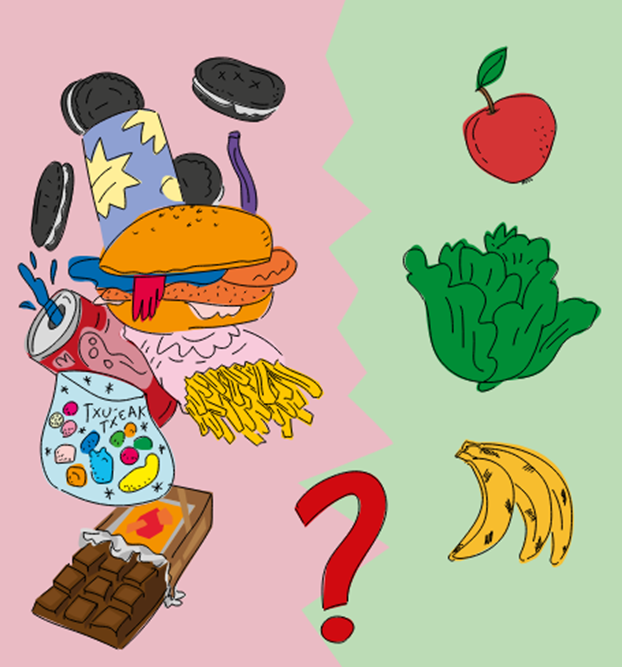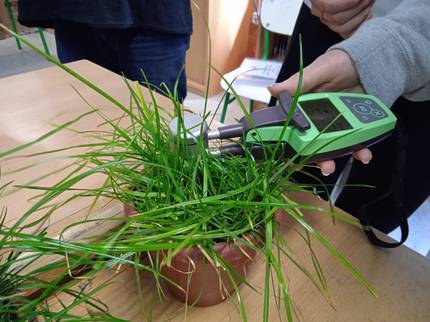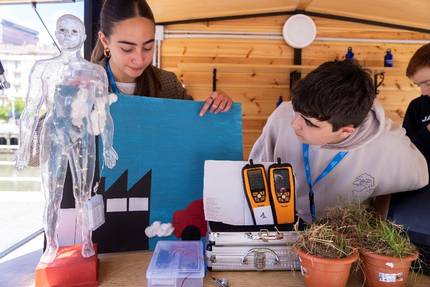“They are not aware of the provenance or temporality of what is in their dishes”
2024/06/19 STEAM-Hezkuntza (Elhuyar Zientzia)
The students of the 1st ESO and Bachillerato of the IES Lizardi de Zarautz, together with the researcher of the Faculty of Pharmacy of Álava of the UPV/EHU Naiara Martínez and his team, have analyzed the sustainable and conscious food within the project “Mesa de los Gluones para la inspiracion de los joven”. They have investigated their eating habits and their impact on the environment.

Sustainable Food is the name of your research team. Who are you in the group?
We're four researchers. We worked with coordinator Marta Arroyo Izaga, Nerea Telleria Aramburu, Iker Alegria Lertxundi and myself. We are graduated in Nutrition and Dietetics, Marta Arroyo also has a bachelor's degree in Pharmacy and I have a degree in Nursing. We are all doctors and, in fact, our thesis director was Marta Arroyo.
Today, Marta and I are also professors of the UPV/EHU and Nerea Aramburu is a professor of Training Cycles, while Iker runs Master's Degree Studies at the university.
What do you do?
Marta studies the influence of diet and lifestyle on our health and diseases, such as obesity or cancers. Iker also looks at the relationship between life and cancer. Nerea investigates the relationship between college students' living habits and obesity, and I investigate the influence of the university food environment on food choice. I focus on students and teachers.
In this case, the young people of the IESO Lizardi of Zarautz have worked with conscious feeding. Why is it important to bring this issue closer to young people?
It is very important to work on this issue with young people. Since they have not yet consolidated their habits, it may be easier to influence them and achieve changes. As age increases, it's harder. When we give a talk to a group of 50-year-olds, we know that it's very difficult to change their internalized habits.
What do you see in general?
In general, what we're seeing among young people is that they consume a lot of ultra-processed and are quite sedentary. In addition, they show a great distance from what they eat. I mean, you don't realize where what's in your dishes comes from, or if it's seasonal. They are rarely going to buy and very few people cook. Words like “KM0” or “Eusko Label” are known, but they do not go too far into it. Some have animals at home -- chickens, sheep -- that are more conscious, but they're a minority.
That is why it is important to educate in a conscious and sustainable diet, to be aware that the benefit is not only for them, but for society as a whole.
What steps have you followed to carry out the research with your students?
In total we have conducted three sessions, before and after which they have been sent a questionnaire on conscious and sustainable eating to see if there has been any change in their beliefs. In addition to the ESO students, the Baccalaureate students have also participated. The latter have also been part of the sample, but also researchers. In other words, they have helped us to collect and interpret the results of the questionnaires.
What questions did you ask?
The questionnaire consists of four sections. In the first one, they were asked about socio-demographic data and studies. In the second, food and lifestyle habits. Physical characteristics (height, weight, etc.) are also collected. ). In the third part, their knowledge and attitudes about sustainable food are collected and, finally, in the fourth part, they are asked whether they intend to change their eating habits.
What are the main conclusions drawn by young people?
In summary, the main conclusions obtained by Baccalaureate students were as follows:
- Students value their health fairly well. The stress level of girls is higher than that of boys. Boys, however, think they have better health and quality of life.
- 18% of students do not have breakfast. The percentage of girls is higher than that of boys (21% of girls, 8% of boys).
- Only 5% of students eat "hot and ready" or "take-away" foods.
- The least recommended foods that students eat are chocolate and sugar.
- Almost all students eat fruit 3 or more days a week, most of them daily.
- Two-thirds of the students eat legumes 3 or more days a week.
- 55% of students eat vegetables 3 or more days a week.
- 9% of students have an inadequate weight.
- The special diet is performed by almost 10% of the students. As for sex, there are no differences. Different reasons have been mentioned: to live healthy, to take care of the weight...
- They say that if they followed a diet, the main reason would be to “eat healthy”.
The research has been presented at the Elhuyar Zientzia Azoka. How important is this?
It is very important that the issue goes out into the street. We, when researching, feel that we are a long way from the citizens. If you find a cure for cancer, you're going to find out the population, but in the rest, our research tends to stay in the lab.
What has caught your attention?
In the second session we held with them, we asked them to list all the foods consumed the day before. Answers from many such as “Cola cao” or “Macarrones!” They asked us, "What does that have?" and they said, "A, milk!" or, "Pasta and tomato." I mean, until we asked that question explicitly, it didn't realize what they ate.
However, this misappropriation of what we eat also occurs with adults. When we ask, “Do you eat 5 pieces of vegetables a day?” we often don’t know how to answer.
Thanks to this initiative, young people have been closely acquainted with researchers and the world of research.
Yes, and I think it's very enriching. Many times, when I say I'm a researcher, people think I'm in the lab because they don't know there's another kind of research. Young people also believe it.
In addition, in our case, 3 out of 4 people are women, which I think can help to create suitable benchmarks for young people.
What has allowed you to participate in this project?
I've learned a lot. I teach in the nursing degree and so far I have not worked on the concept of sustainable food. I have now put it on my agenda.
Moreover, it has been a good opportunity to share knowledge among researchers. Although we are all researchers from the same area, everyone has been at the forefront of their specialization.
In Zarautz you have done the first test. Looking to the future, do you find it interesting that other educational centers in the Basque Country know your research and participate in projects of this kind?
Yes. In addition, we can apply what we've learned in this first experience. For example, it has cost us a little bit more with those of the ESO, so I would recommend working with older people.
In addition, it would be interesting to extend it outside Gipuzkoa. As we have said, conscious and sustainable food affects not only the individual but also society. Therefore, the younger they participate and the more places they are, the greater the capacity to bring about change.
This project, promoted by Elhuyar, is supported by the Department of Economic Promotion and Strategic Projects of the Provincial Council of Gipuzkoa.

Gai honi buruzko eduki gehiago
Elhuyarrek garatutako teknologia






